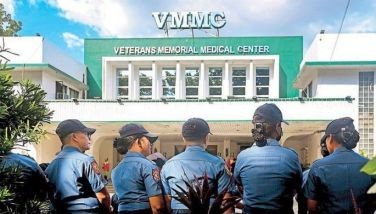Prisoner Y
(Note: Our story this week is rather serious and might not go well with breakfast; best read with a sobering cup of coffee.)
Prisoner Y was still chewing on a tasty strip of cartilage that clung to the meatless rib he had fished out of the soup when he felt Cortes’ breath on his nape and heard his wheezing voice: “The warden wants to see you. Now.” He stood up, tossed the rib back onto his tray – a hand quickly grabbed it from nowhere – and turned to follow the guard. He wondered what the warden wanted this time.
Nearly all the fans in the mess hall were out of commission and the inmates’ sweat mixed in the air with the fat curdling in the lukewarm broth, and Prisoner Y looked forward to the air-conditioning in the warden’s office, although he was sure the warden didn’t call him in for a conversation. The last couple of times, in fact, it was the warden’s secretary who had spoken to him, and he barely glimpsed the warden through the half-open door.
The first time, he was picked up just outside the service gate by three men in an SUV, who brought him to a warehouse in Parañaque, where a man was trussed up, his head in a sack, screaming in a language Prisoner Y couldn’t make out. One of the men handed Prisoner Y a .45 and nodded; another man pointed another .45 at him; the third man held up his phone and recorded everything. Prisoner Y aimed at the victim’s head and fired; the body spasmed and stopped writhing. They drove him back to the prison, where Cortes met him at the gate and ushered him back to his cell.
When his cellmates asked where he had been – now and then one of them would be gone like that for a day – Prisoner Y said that the warden had asked him to do some carpentry at his home; he had been a handyman in his past life, before the debts piled up and he learned to do other things with his hands. When someone asked him why he didn’t make a break for it while he could, and someone else remarked how all he wanted was an hour at the mall to savor the cool air and watch the salesgirls bending over, Prisoner Y said – truthfully, recalling how humid that warehouse was and how it reeked of stale oil and some shapeless menace – that he felt safer inside.
On his wife’s next visit that Sunday, she was deliriously happy. A man had come by their house, she said, and had dropped off some money in an envelope, saying that it was something owed her husband for a job he had done inside the prison. What did you do, she asked, did you build a house for the warden? It was enough to buy a new stove and a smartphone for Carmela, who needed it for school. I worked on the prison chapel, he lied, knowing it would make her happy; the old roof was leaking and you know the chapel is the warden’s pet project.
The second time it was different, because he had to ride on the back of a motorcycle that one of his handlers drove, and shoot his target on the run. The man, he realized to his horror, was the prison chaplain, walking the street in a Hawaiian shirt and slacks, as though on his day off, in search of a special meal or a movie to watch. Instantly, Prisoner Y understood – the chaplain had spoken to the media about how prisoners complained to him about their food, how the prison officials skimmed a percentage off every sack of rice and kilo of stringy pork that entered the kitchen; there was talk of an investigation, although the inmates doubted anything would come out of it. He was there to make sure. It should have been easier to do with the priest in common garb, shorn of his soutane, but then the priest turned toward him as he fired and he could see the man’s terminal expression, one more of resigned acceptance than anything else. Despite himself, Prisoner Y muttered a prayer for forgiveness as they sped away.
Today, Cortes led him past the secretary straight into the warden’s office and closed the door behind them. The warden was on his cellphone, a cigarette in his other hand; some ashes drifted onto his barong and he shot up from his seat to stub the cigarette into an ashtray and flick the ashes off without any change of voice in his phone conversation. “Of course, pañero, you don’t even need to ask, send my love to Mercy and the girls.” He shut his phone off and turned to Prisoner Y, who remained standing with his hands behind him. “How’s your wife? Is she happy? You know what they say – happy wife, happy life!” Prisoner Y murmured something like “Yes she is, thanks,” but the warden was already coming over to his side of the table. “Let’s take a walk,” he said. “I want to talk about your future.” What was there to talk about? The future was his life sentence for murder.
In his six years in the penitentiary, Prisoner Y thought he had seen everything, every grimy corner of it, even the luxury suites inhabited by the drug lords and out-of-power politicians, but now the warden led him past the kitchen down a corridor he had assumed led to cold storage, and he was right; when Cortes unlocked the doors and pulled them open, a blast of cold air stung his nose, along with an acrid curl of some potent chemical.
The warden flicked the light switch on and Prisoner Y saw them: a swarm of cadavers – some on raised platforms, many just on the floor, under browning blankets that could not cover everything. He could see fingers withered dry. “Stabbings, cancer, TB, chokings – they all end up here, the ones without family, the ones no one will miss. We should just burn these but there’s a budget for their maintenance. I’ve made sure of that.”
“Why did you bring me here?”
The warden nudged the edge of one blanket with his foot. “Your next job will be so important that it will have to be done by someone who might as well be dead.” Prisoner Y rubbed his arm and said, “I still have a family.” The warden looked at him calmly and said, “I know. You do. That’s why we’re here.” Prisoner Y shivered from a chill colder than bare ice.
* * *
Email me at [email protected] and visit my blog at www.penmanila.ph.
- Latest
- Trending

































